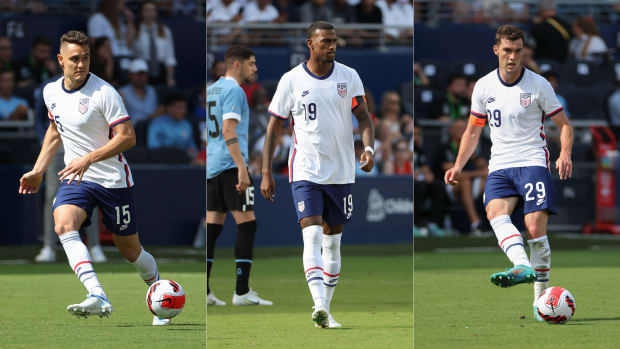Few clear and obvious questions remain about the U.S.’s World Cup squad, and two upcoming Nations League games will be used to help find solutions.
The U.S. men’s national team may be kicking off a title defense Friday night, but you’d have to forgive most for viewing its Concacaf Nations League matches in a different light. The 2022 World Cup is overshadowing and coloring everything the U.S. does, from club performances and moves to national team games between now and the conclusion of the U.S.’s run in Qatar later this year.
Gregg Berhalter has spent his time as manager cultivating the U.S. player pool, exploring his options and building out the depth chart, and as of now, a good chunk of the U.S.’s ideal roster for the competition is unofficially set. There are a couple of issues with that, though. First, there’s the fact that the U.S. has never had its ideal XI on the field together due to injuries and other absences and is bound for a curveball or two, and second, there are some key areas that are still very much up in the air.
With scant time together remaining before the U.S.’s roster for Qatar is set—two Nations League games in the next week and two September friendlies in Europe against Asian competition is all that’s left—each match left will get put under the microscope to a greater degree. Even a Friday-night bout vs. 170th-ranked Grenada and a match in El Salvador on June 14, where the U.S. began its World Cup qualifying journey, will take on greater meaning for a select grouping of players vying for tickets to Qatar.
It’s been expressed that these are not out-and-out auditions, and that the upcoming performances, just like ones in friendlies against Morocco and Uruguay over the last week, are not the end-all. What occurs in training behind closed doors and how certain players alter the team dynamic will certainly be taken into account as Berhalter makes his final cuts. But the games will provide data points used as part of the bigger picture, and there are certain positional battles that merit a closer watch as the U.S. fine-tunes with all eyes on November dates with Wales, England and Iran.

Imago Images (3)
STRIKER
The center-forward struggle is nothing new. Jesús Ferreira, MLS’s co-leading scorer, started both friendlies in this window and provided more of the same of what he’s shown in his time with the national team. He gets into dangerous spots, and his movement opens up opportunities for U.S. wingers, but his finishing touch has been off. Perhaps with a better cross, he converts his best chance vs. Uruguay, but regardless, the U.S. is lacking for goals from up top. Haji Wright scored on a penalty kick that Christian Pulisic earned against Morocco and then didn’t have much to do at the disjointed end of the Uruguay game. You’d expect for him to get more time in the next two games, with limited opportunities for exposure and a desire to determine whether his late-season form in Turkey can be translated to the national team. With others like Ricardo Pepi, Josh Sargent, Daryl Dike and Jordan Pefok waiting in the wings for a recall in September, this is Ferreira’s and Wright’s time to either distance themselves from the pack or further muddle the picture.
BACKUP LEFT BACK
The starting position is Antonee Robinson’s to lose, but were he to go down with an injury or have to miss a match due to suspension, there’s no clear heir apparent. Sergiño Dest’s shifting to the left would make the most sense, especially given the depth at right back, but he’s out injured and not in this camp. Joe Scally, who started and struggled vs. Uruguay, and George Bello, who didn’t play in either friendly in the last week, are the current in-house options, and it shouldn’t be a surprise to see them get extended looks in the upcoming games as Berhalter seeks to increase the evidence at his disposal.
GOALKEEPER
Matt Turner started vs. Morocco, while Sean Johnson got a look vs. Uruguay and neither did anything to hurt their cause. Neither conceded a goal—although the U.S. was fortunate to have escaped Uruguay with the draw thanks to Edinson Cavani’s stoppage-time miss—and both looked capable in the moment. Zack Steffen’s absence and the fact that he, Turner and Ethan Horvath are currently all on track to be backup goalkeepers in the Premier League does not help deliver any clarity to the situation. If seeking answers is one of the goals for this camp, then giving Horvath a run-out either Friday in Texas or four days later in San Salvador would make plenty of sense, but it’s a positional race that figures to run deep into the fall.
CENTER BACK NO. 2
Walker Zimmerman appears to be pretty entrenched as a starter, but Miles Robinson’s long-term injury, Chris Richards’s shorter-term one and John Brooks’s extended exile have opened up a pretty big opportunity in the back. Aaron Long has started both matches in camp thus far, indicating that if he isn’t the leader of the pack there’s at least an interest in giving him every chance to become it. Erik Palmer-Brown and Cameron Carter-Vickers have each played a second half in the first two games, and it would behoove both of them—and Berhalter—for their playing time to expand over the next 180 minutes, so the U.S. can have a greater idea of what it’s working with at a position of utmost importance.
More Soccer Coverage: